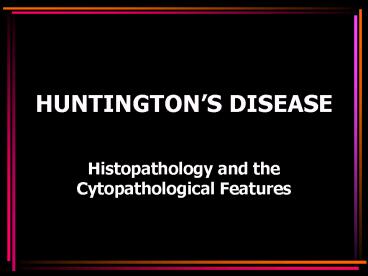HUNTINGTONS DISEASE - PowerPoint PPT Presentation
1 / 13
Title:
HUNTINGTONS DISEASE
Description:
Cytopathology A branch of pathology that deals with manifestations of disease ... BDNF's are pro-survival factors produced by the cortical neurons of the brain. ... – PowerPoint PPT presentation
Number of Views:162
Avg rating:3.0/5.0
Title: HUNTINGTONS DISEASE
1
HUNTINGTONS DISEASE
- Histopathology and the Cytopathological Features
2
DEFINITIONS
- Histopathology The tissue changes that affect
part or accompany a disease
Cytopathology A branch of pathology that deals
with manifestations of disease at a cellular
level
Taken from dictionary.com
3
THE HUNTINGTIN PROTEIN
- Huntingtin is a 350kilodaton protein that
regulates the transcription of Brain Derived
Neurotrophic Factors (BDNFs). - BDNFs are pro-survival factors produced by the
cortical neurons of the brain. They are
necessary for the survival of the striatal
neurons in the brain.A mutated version of the
Htt protein can lead to decreased levels of
BDNFs being synthesised therefore the neurons
will not receive as much support. This can result
in neuron death.
4
PROTEIN AGGREGATES
- Mutated Htt proteins can contain 40 glutamines
(in comparison with the normal 10-35). - Glutamine is polar and so can make bonds within
and outside the protein. - This turns what would be a functionally folded
protein into a ridged, tangled clump known as a
protein aggregate.
5
NEURONAL INCLUSIONS
- Having excess Glutamine can also lead to another
form of protein bundling called neuronal
inclusions. - NIs form at the axons and dendrites of nerve
cells in specific areas of the brain and damage
the neurons. - NIs can cause structural changes to the cell and
can interfere with normal protein production
which again can lead to neuron damage or death. - Another problem is that an enzyme splices Htt
into smaller fragments which enter the cell
nuclei and clump at the centrosome.
6
(No Transcript)
7
Htt THE KIDNAPPING PROTEIN
- A recent John Hopkins University study has
revealed that mutated Htt entangles and inhibits
CREB (a binding protein that is key for cell
survival). - They found that the glutamine regions on CREB
interacted with the extra glutamines on the Htt
protein. - This interaction pulls the CREB away from the
nucleus and prevents it from functioning. - However researchers have come up with an answer,
they inserted engineered CREB which lacked the
glutamine repeats and so couldnt interact with
the Htt. - This worked and the nerve cells lived.
8
QUALITY CONTROL IN THE CELL
- Healthy cells have a quality control mechanism
called the ubiquitin-proteasome system (UPS). - In a healthy cell this system tags mis-folded
proteins so they can be broken down and the amino
acids recycled - However in HD this system fails and aggregates
accumulate.
9
NEUROBIOLOGY
- The group of cells that are most affected in HD
are found at the base of the brain and are
collectively known as the Basal Ganglia. - The BG is responsible for muscle driven (motor)
movements of the body. - The Basal Ganglia is split into 2 major regions
called the Caudate and the Putamen. - Together these regions are known as the
Striatum.
10
The striatum is highlighted in blue. The lower
section of blue is the putamen and the higher
section is the caudate nucleus
11
HD sufferers have enlarged spaces in their Basal
Ganglia due to the death of the nerve cells in
the striatum.Other areas of the brain are
affected too but it appears that the BG is hit
the hardest by the disease.
12
SUMMARY
- The Huntingtin Protein (Excess Glutamine)
Protein AggregatesNeuronal InclusionsKidnap
ping - UPS System Fails
- Basal Ganglia Degenerates
13
References
- Colour coded Brain Picture from www.anc.ed.ac.uk
- Definitions taken from www.dictionary.com
- Information and rest of the pictures taken from
www.hope.com































